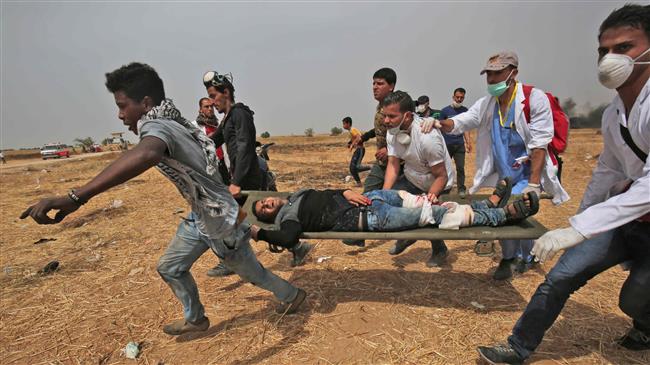
RNA - The Friday protests left four Palestinians dead, including a 14-year-old child, almost 1,000 injured, including 76 children and 39 women, and 178 injured from live bullets, eight of them in critical condition, according to the Ministry of Health, WAFA reported.
Overall, since March 30 when the Great Return March protests began, over 40 Palestinians were killed and over 6,000 injured, including over 600 children and more than 200 women, around 150 critically injured, and almost 2,000 shot with live ammunition including more than 230 shot in the neck and head, 450 in the upper parts, more than 120 in the back and chest, 140 in the abdomen and pelvis, over 1,700 in the lower extremities.
In addition, the Ministry reported 21 cases of limbs amputations (not including the last Friday injuries); four amputations in the upper limbs, including one in the palm of the hand and three fingers, and 17 amputations in the lower limbs.
In its fresh update report following the Friday protests, the United Nations Office for the Coordination of Humanitarian Affairs (OCHA) to the occupied Palestinian territory said humanitarian actors have identified three areas of intervention that are critical to respond to the urgent needs arising from the ongoing protests in Gaza: providing immediate life-saving healthcare; monitoring, verifying and documenting possible protection violations; and scaling up the provision of mental health and psychological support for people injured or otherwise affected by the events.
Some $5.3 million is urgently required to scale up the immediate response until 31 May, the expected six-week duration of the Great Return March demonstrations, plus an additional two weeks to ensure immediate response to any affected on 15 May, the apex of the protests that coincides on the Palestinian Nakba anniversary marking 70 years of Palestinian dispersion and uprooting from their homeland, according to OCHA.
On 25 April, the Humanitarian Coordinator released $2.2 million available in the occupied Palestinian territory’s Humanitarian Fund (HF) reserve for unforeseen emergencies, to support the three areas of intervention.
The health response is the main priority, given the enormous rise in casualties against the backdrop of a health system on the verge of collapse, OCHA said.
The Health Cluster will utilize the $1.8 million released in the HF to deploy surgeons to Gaza to conduct lifesaving surgery; initiate rehabilitation outreach teams; enhance post-operative care; and provide life-saving medical supplies.
A large percentage of patients hospitalized since the start of the demonstrations suffered severe wounds to the lower extremities, requiring complex surgical operations; many of them will have disabilities for life.
The exposure to violence has also had significant mental health and psychosocial ramifications, particularly among children.
847/940